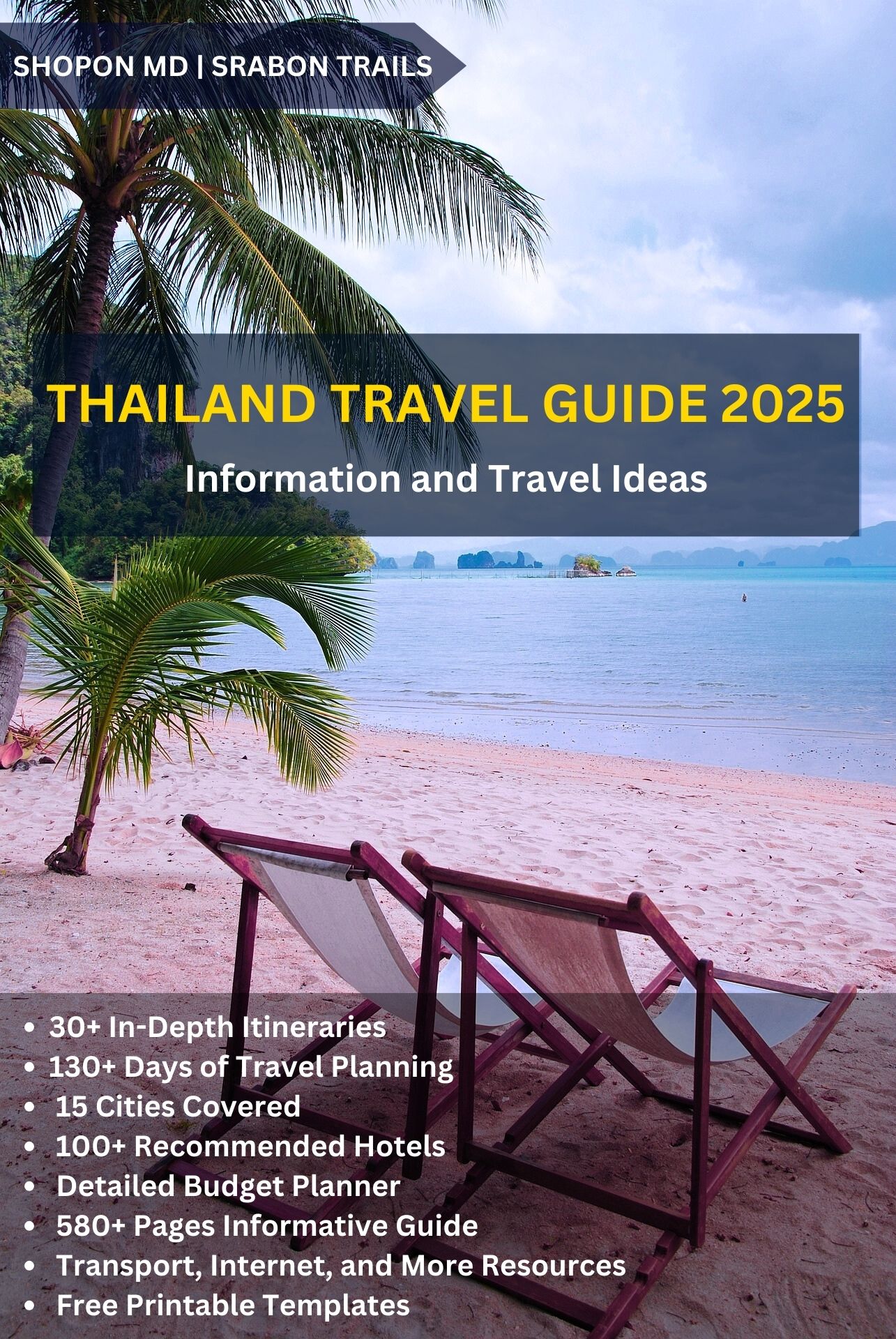Traveling Between Macau and Hong Kong: A Comprehensive Guide by Ferry and Bus
Planning a trip between Macau and Hong Kong? These two dynamic destinations are rich in culture, history, and entertainment. Macau is famous for its Portuguese heritage, casinos, and unique food scene, while Hong Kong offers a bustling urban vibe, shopping, and iconic attractions like Victoria Peak. This guide provides a detailed breakdown of the best ways to travel between Macau and Hong Kong, including by bus via the Hong Kong-Zhuhai-Macau Bridge (HZMB) and by ferry, with all the necessary details about routes, costs, immigration processes, and travel tips. Additionally, we’ll include practical advice for navigating immigration and exploring each destination after your arrival.
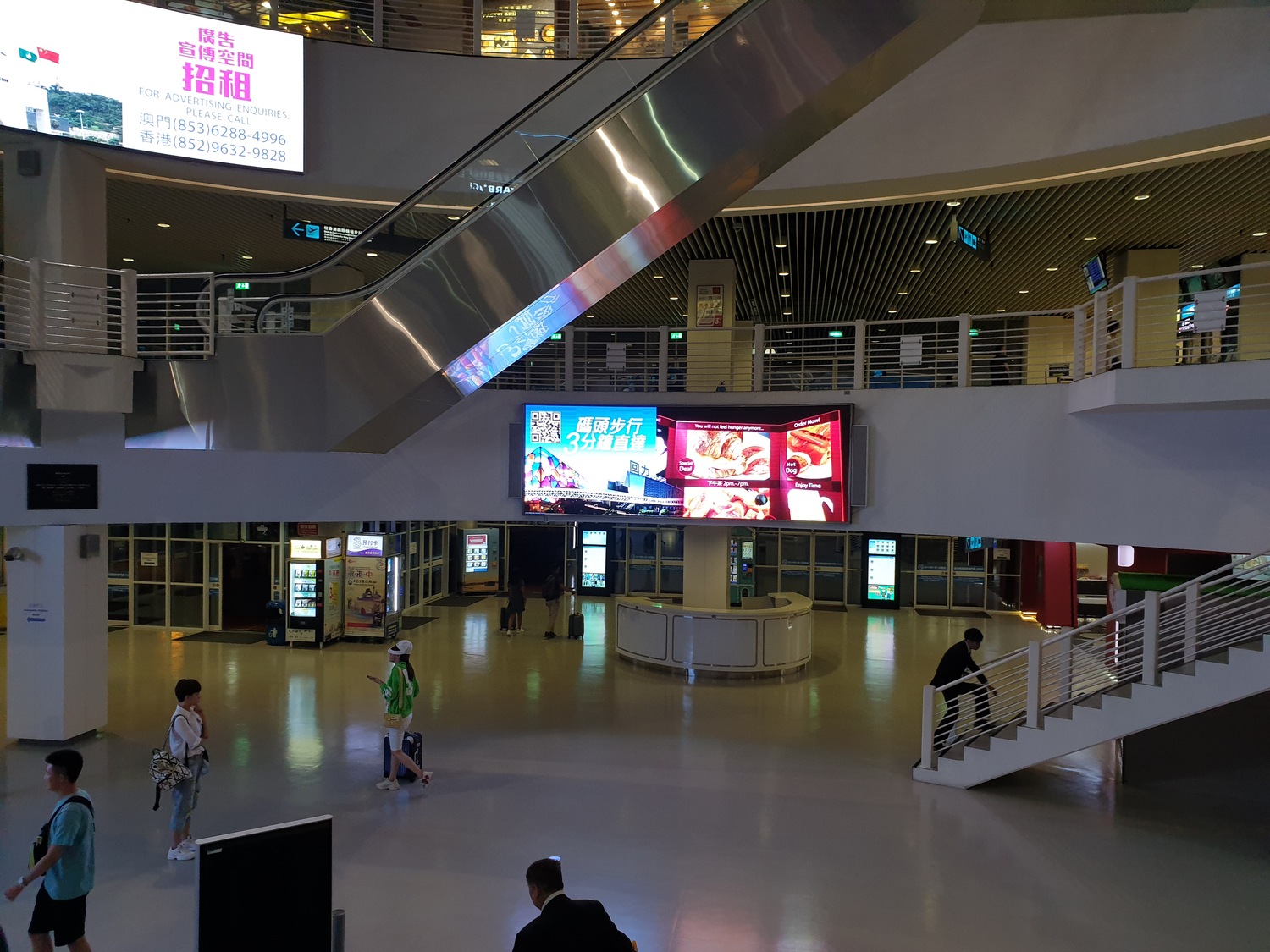
Option 1: Traveling by Bus
The Hong Kong-Zhuhai-Macau Bridge (HZMB) is the longest sea-crossing bridge in the world and a technological marvel. It directly connects Hong Kong and Macau via Zhuhai, making traveling by bus one of the most convenient and affordable options for travelers.
Where to Board the Bus
If you’re starting in Hong Kong, buses depart from the Hong Kong Port of the HZMB. This port is easily accessible by public transportation, including MTR Tung Chung Line and public buses like Routes B5 or B6. If you’re closer to the airport, you can also use shuttle services or taxis to reach the port.
In Macau, buses leave from the Macau Port of the HZMB. This port is well-connected to major parts of the city, including the Cotai Strip and the historic center, through local buses and taxis.
Timetable for Buses
| Bus Company | Departure Time (Hong Kong) | Departure Time (Macau) | Frequency |
|---|---|---|---|
| Hong Kong-Macau Express | 6:00 AM – 11:59 PM | 6:00 AM – 11:59 PM | Every 15-20 minutes |
| Golden Bus | 24/7 | 24/7 | Every 10-15 minutes |
During peak seasons and holidays, the frequency of buses may be slightly reduced or adjusted, so it’s always a good idea to confirm the schedule beforehand.
Klook.comCost of the Bus Trip
The cost of traveling by bus varies depending on the time and route. For most trips:
- Hong Kong Dollars (HKD):
- Regular hours: HKD 65–75 for adults and HKD 33–40 for children or seniors*.
- Peak hours (weekends and public holidays): HKD 70–80.
- Macanese Patacas (MOP):
- Regular hours: MOP 67–78 for adults and MOP 34–42 for children or seniors*.
- Peak hours (weekends and public holidays): MOP 72–82.
Tickets can be purchased at the terminal using cash, Octopus cards, or online booking platforms.
Bus Services Provided
Buses are modern, comfortable, and equipped with a range of amenities to make the journey pleasant. Here’s what you can expect:
- Fully air-conditioned coaches with ample legroom.
- Free luggage storage in the bus’s cargo hold.
- Complimentary Wi-Fi on select buses (check with the operator).
- USB charging ports and reclining seats on some services.
Immigration Process
The immigration process is straightforward but requires some preparation to ensure smooth transit.
- At your departure port, proceed to the immigration checkpoint with your passport, visa (if required), and any entry/exit permits.
- After clearing immigration, you can board your bus. Tickets will be checked before boarding.
- Upon arrival at the destination port, you’ll need to clear immigration again. Queue times can vary based on the time of day and passenger volume.
Tip: Keep your documents organized and accessible, as you’ll need them multiple times during the journey.
Contact Information & Websites
For reliable service, here’s where you can find more details:
- Hong Kong-Macau Express
- Website: www.hkmex.com
- Customer Service: +852 1234 5678
- Golden Bus
- Website: www.goldenbus.com
- Customer Service: +853 8765 4321
Option 2: Traveling by Ferry
Traveling by ferry between Macau and Hong Kong has been a popular choice for decades. Ferries are fast, comfortable, and provide scenic views of the Pearl River Delta during the ride.
Where to Board the Ferry
In Hong Kong, ferries depart from three main terminals:
- Hong Kong-Macau Ferry Terminal: Located in Sheung Wan, this terminal is the most convenient for those staying on Hong Kong Island.
- China Ferry Terminal: Situated in Tsim Sha Tsui, it’s ideal for travelers based in Kowloon.
- Skypier: Located at Hong Kong International Airport, it offers limited services for transit passengers.
In Macau, ferries arrive at either the Outer Harbour Ferry Terminal (closer to the city center) or the Taipa Ferry Terminal (near the Cotai Strip).
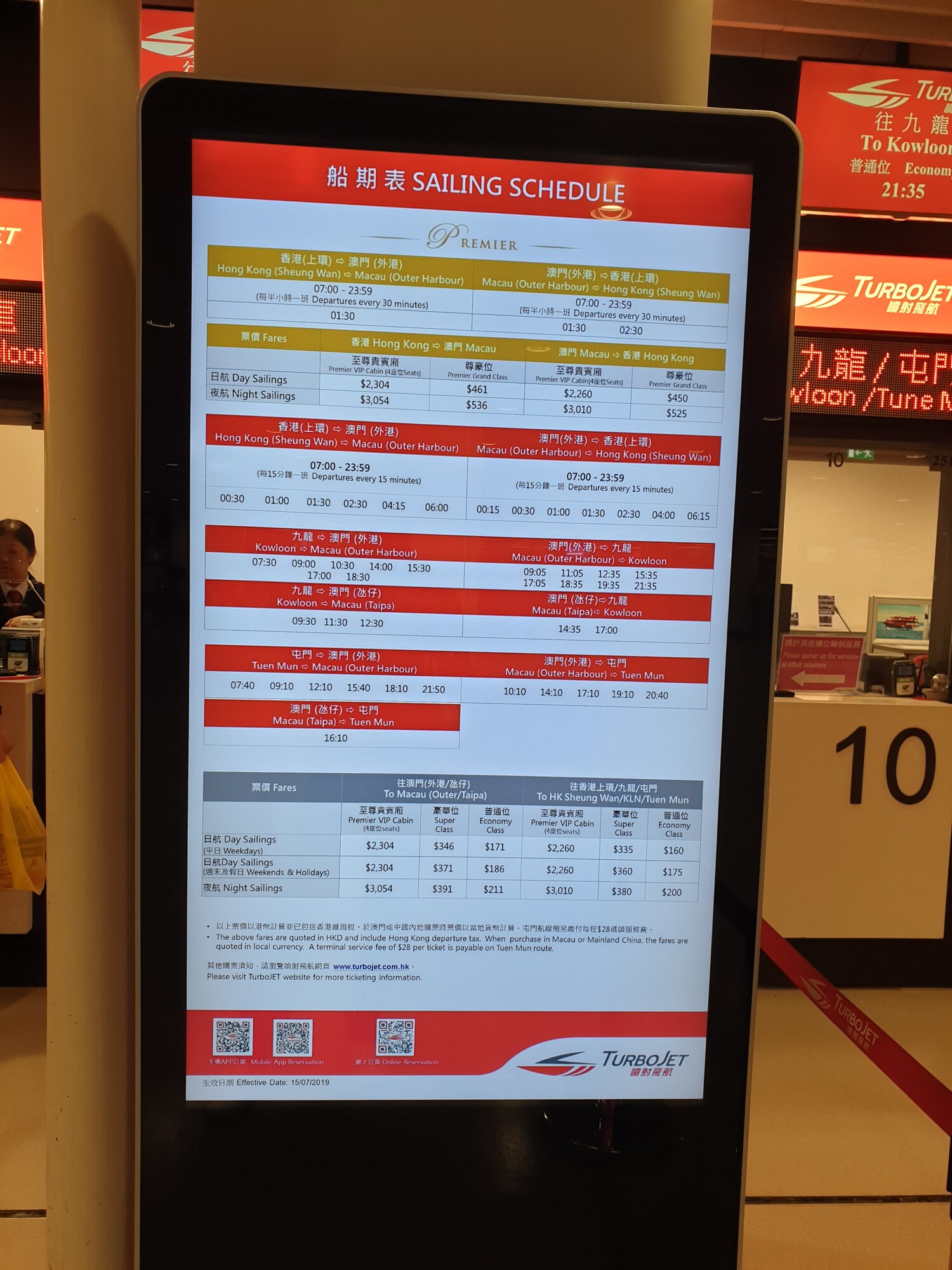
Timetable for Ferries
| Ferry Company | Route | Frequency | Travel Time |
|---|---|---|---|
| TurboJET | Hong Kong ↔ Outer Harbour | Every 15–30 minutes | ~60 minutes |
| Cotai Water Jet | Kowloon ↔ Taipa | Every 30 minutes | ~60 minutes |
During typhoon season, ferry services may be delayed or canceled, so it’s always wise to check with the operator beforehand.
Cost of the Ferry Trip
Ferry ticket prices depend on the class of service you choose.
- Economy Class: HKD 170–200 (MOP 175–205) for a one-way ticket.
- Super Class: HKD 300–400 (MOP 310–410) for added comfort.
- VIP Cabin: HKD 1,500+ (MOP 1,550+) for private cabins with personalized service.
- Surcharges may apply during weekends, holidays, or night sailings.
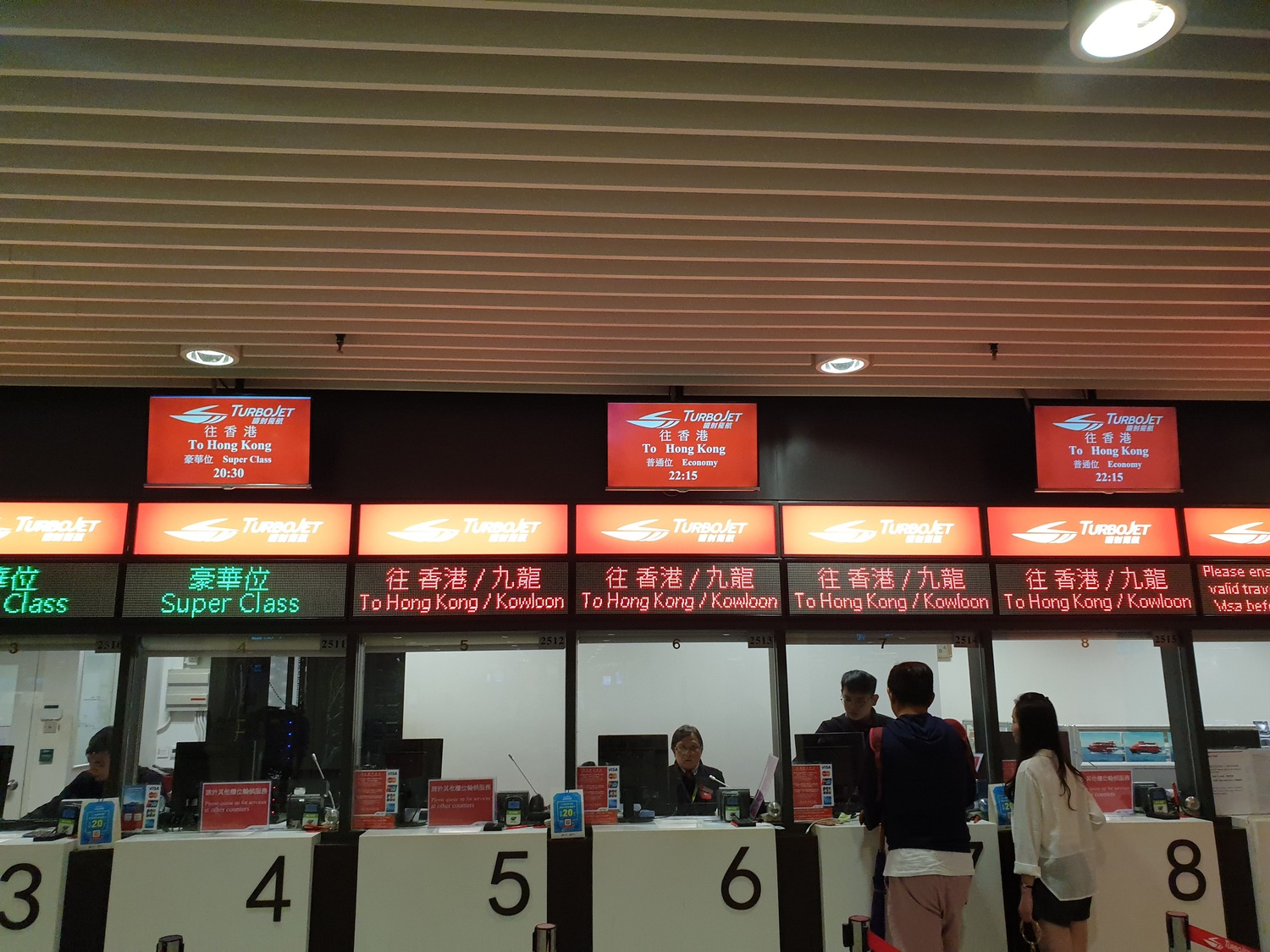
Ferry Services Provided
Ferries are well-equipped to ensure a comfortable and pleasant journey:
- Spacious seating with air-conditioned cabins.
- Luggage allowances (specific policies vary by operator).
- Snack bars offering light refreshments for purchase.
- Restrooms onboard for passenger convenience.
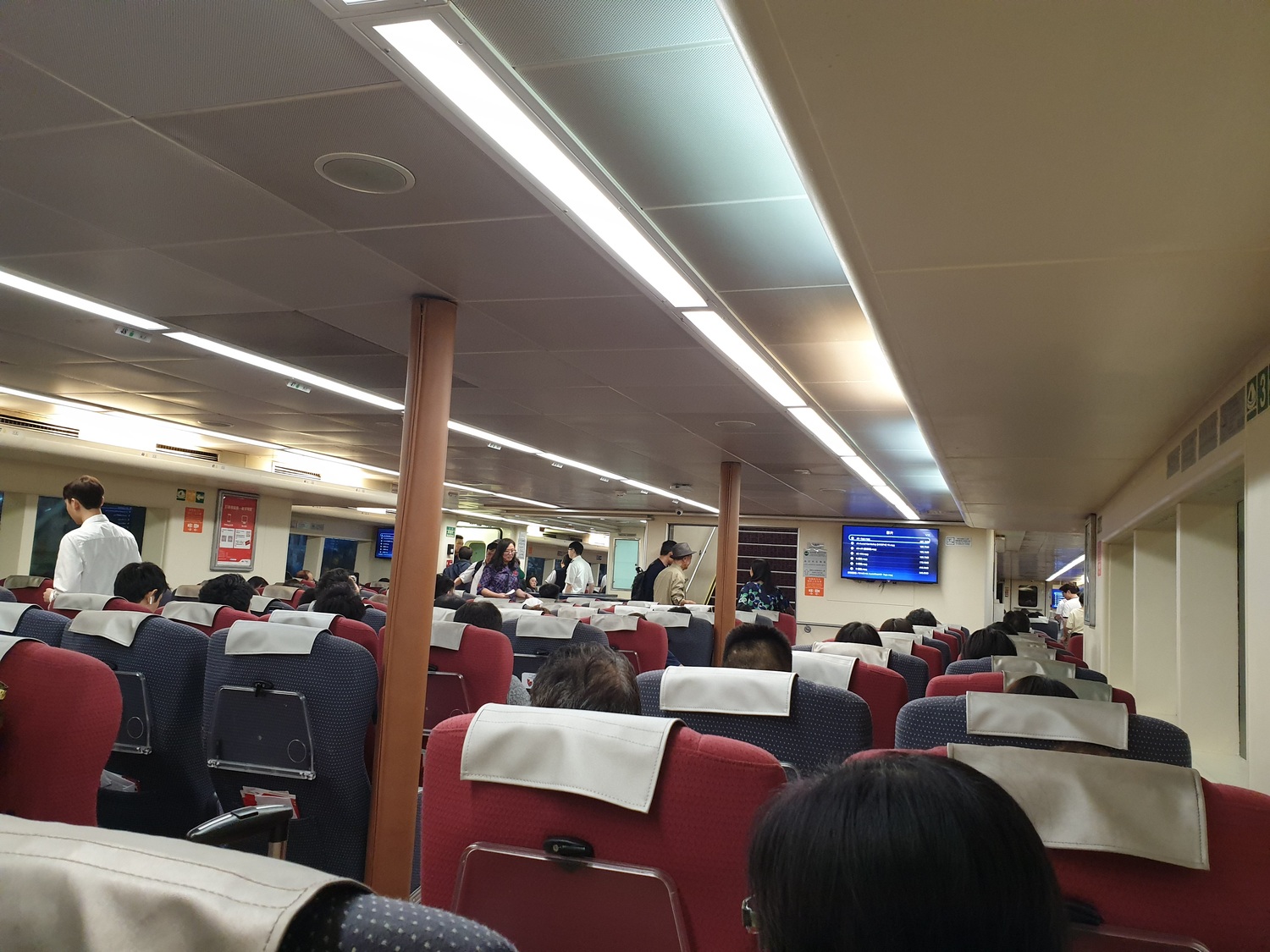
Immigration Process
As with the bus, the immigration process involves clearing checkpoints at both the departure and arrival terminals.
- Arrive at the terminal 30–60 minutes before departure to allow time for check-in and immigration clearance.
- Keep your passport and ticket accessible for inspection at both ends of the journey.
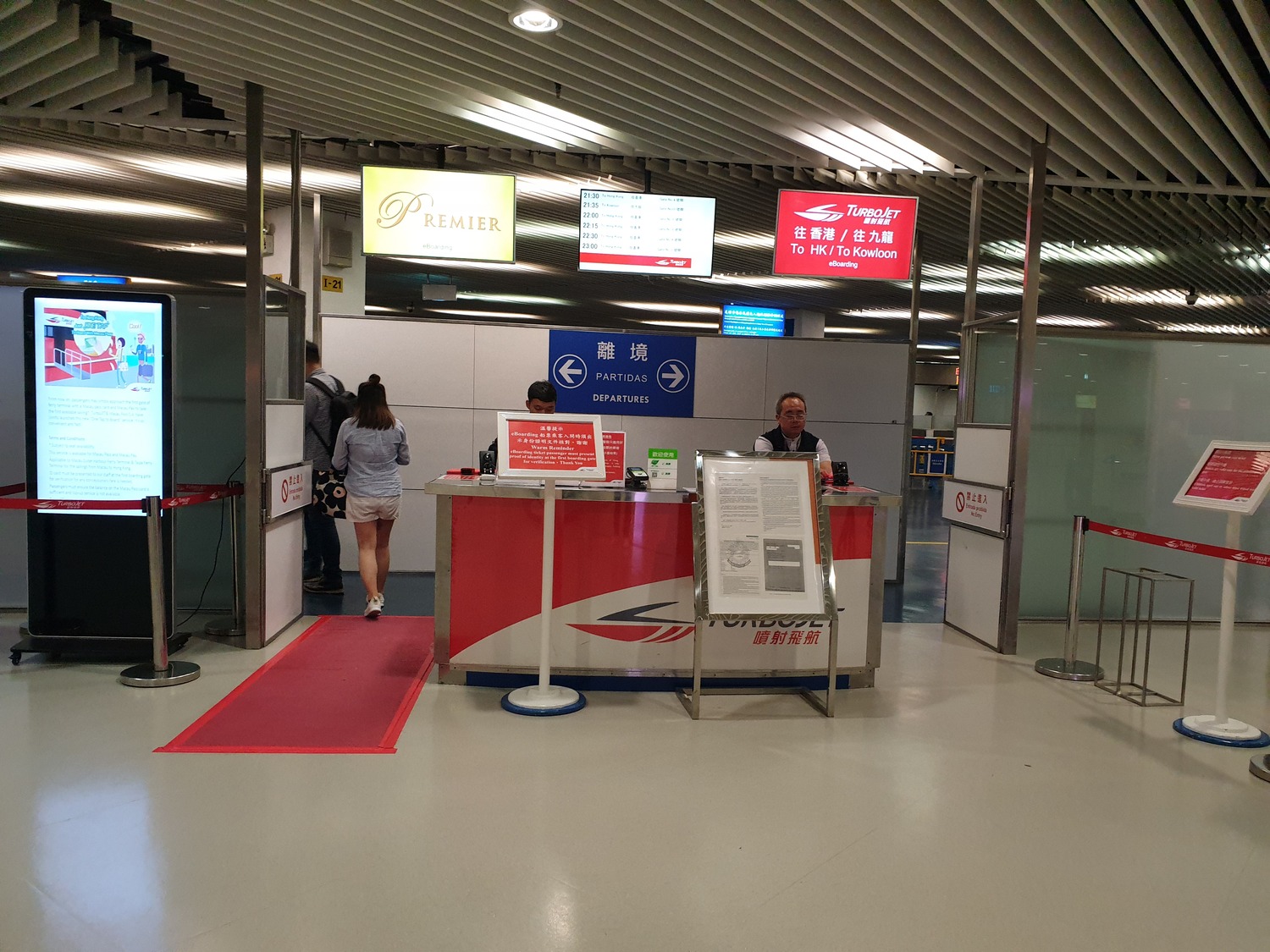
Traveling with Children
Traveling with kids? Both buses and ferries cater to families with children, making the journey comfortable:
By Bus
- Child Tickets: Reduced fares for children under 12 years old. Infants under two years often travel for free but must sit on an adult’s lap.
- Travel Comfort: Bring small toys, books, or snacks to keep kids entertained during the ~40-minute bus ride.
By Ferry
- Family Cabins: Some ferries offer private family cabins (VIP cabins) for a quieter and more relaxing journey.
- Child Safety: Life vests are provided for children, and staff are trained to assist families.
Bringing Pets or Large Luggage
By Bus
- Pets: Generally, pets are not allowed on buses unless they are service animals.
- Luggage Allowance: Large suitcases and bags can be stored in the luggage compartment. Carry-on items must fit in the cabin storage space.
By Ferry
- Pets: Policies vary by ferry operator, but pets are typically not allowed in passenger cabins. Some ferries may allow pets in designated areas if properly crated.
- Luggage: Economy-class tickets often include free baggage up to 20kg. For additional luggage, you may need to pay extra fees.
Currency Exchange Locations:
While Hong Kong Dollars (HKD) are widely accepted in Macau, it’s good to have some Macanese Patacas (MOP) on hand for local expenses, such as small shops, public transport, or street food stalls.
- Hong Kong: Currency exchange counters are available at ferry terminals and major banks.
- Macau: You can exchange money at ferry terminals, casinos, and banks.
Exchange Rate: - HKD 1 ≈ MOP 1.03. Both currencies are accepted interchangeably in many places, but change is often given in MOP when shopping in Macau.
Special Promotions and Discounts
- Discounts are often available for round-trip tickets or group bookings.
- Golden Bus sometimes offers promotional fares during weekdays or off-peak hours.
- TurboJET and Cotai Water Jet frequently provide discounts for:
- Round-trip tickets.
- Advance bookings made online.
- Special promotions during off-peak travel periods.
Additional Tips for Ferry Travel
- If you’re prone to motion sickness, consider taking medication before boarding, as the ride can be choppy during bad weather.
- Book your tickets online to secure seats during peak travel seasons.
- The Taipa Ferry Terminal is closer to popular resorts like The Venetian, making it a better option for casino-goers.
- Always contact the bus or ferry operator beforehand to ensure necessary accommodations are arranged.
- Book tickets in advance if traveling during holidays or weekends, as family-friendly seating may be in high demand.
- Typhoon season (typically June to October) can lead to ferry cancellations. Operators like TurboJET and Cotai Water Jet provide real-time updates on their websites and social media channels.
- Always check the weather forecast and confirm your booking during typhoon season. Keep a flexible schedule if delays or cancellations occur.
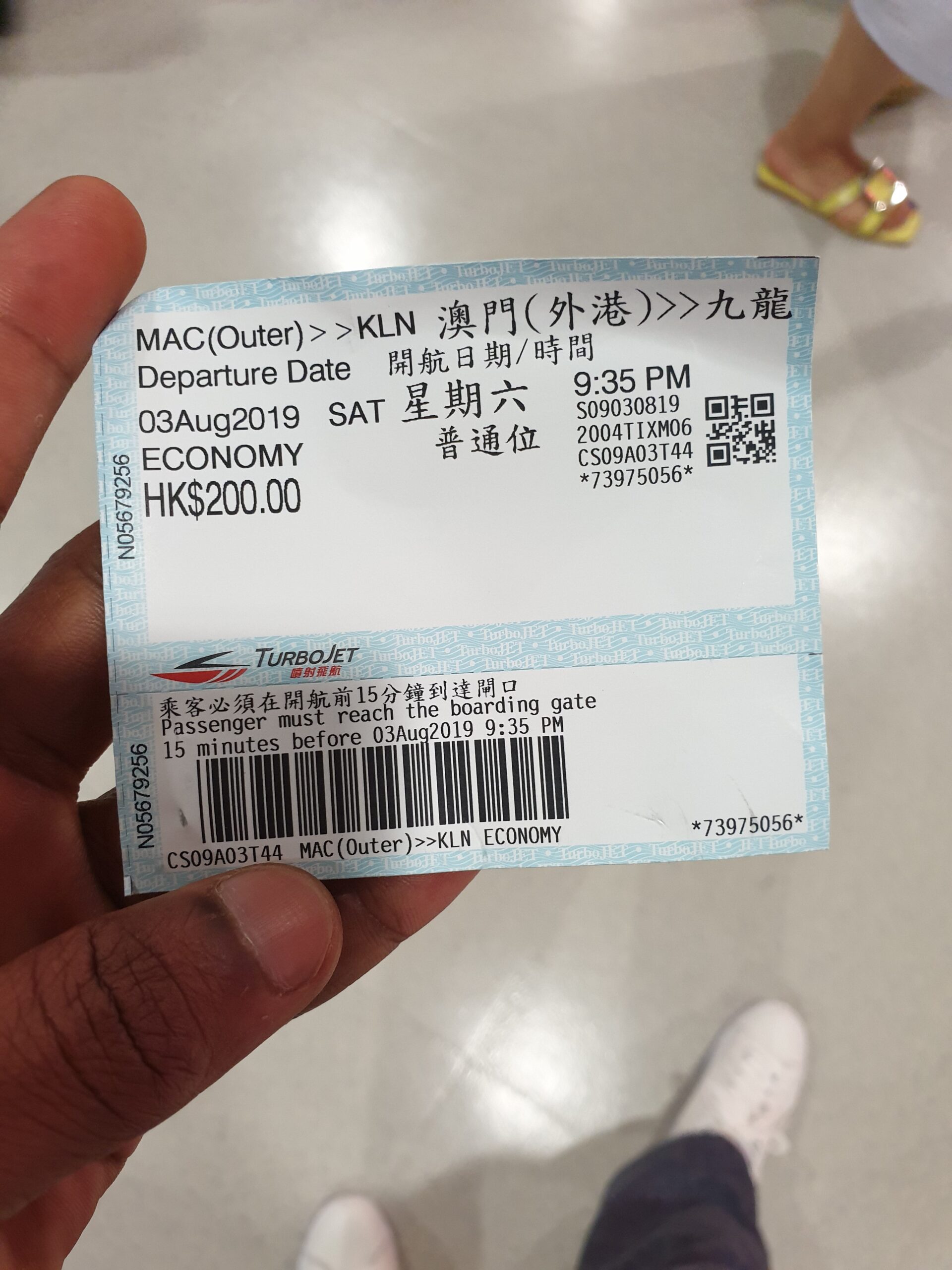
How to Choose Between Bus and Ferry?
Here’s a quick comparison to help you decide:
| Criteria | Bus | Ferry |
|---|---|---|
| Cost | Cheaper: HKD 65–80 (MOP 67–82) | Higher: HKD 170–400 (MOP 175–410) |
| Travel Time | ~40 minutes (including immigration clearance). | ~60 minutes (excluding boarding time). |
| Comfort | Modern buses with basic amenities. | Spacious seating and premium options. |
| Convenience | Operates 24/7 with frequent departures. | Limited nighttime service. |
| Weather Impact | Minimal impact from weather conditions. | Delays possible during typhoon season. |
Alternative Travel Options
If buses and ferries don’t fit your needs, consider these alternatives:
- Helicopter:
- Travel Time: 15 minutes.
- Cost: HKD 4,300+ (MOP 4,400+).
- Provider: Sky Shuttle offers luxurious helicopter rides between Macau and Hong Kong.
- Private Car Service:
- Ideal for families or groups.
- Cost: HKD 1,500–2,000 (MOP 1,550–2,100) per trip.
- Group Tours:
- Some tour operators offer package deals that include transportation and guided tours in both cities.
Traveling between Macau and Hong Kong is an adventure in itself, with the bus and ferry offering different experiences to suit every traveler. Whether you’re seeking the budget-friendly and efficient option of the bus or the scenic and comfortable ride of the ferry, both modes of transport provide reliable connections. By planning ahead, staying informed about immigration requirements, and taking advantage of travel tips, you’ll be well-prepared for a smooth journey.








